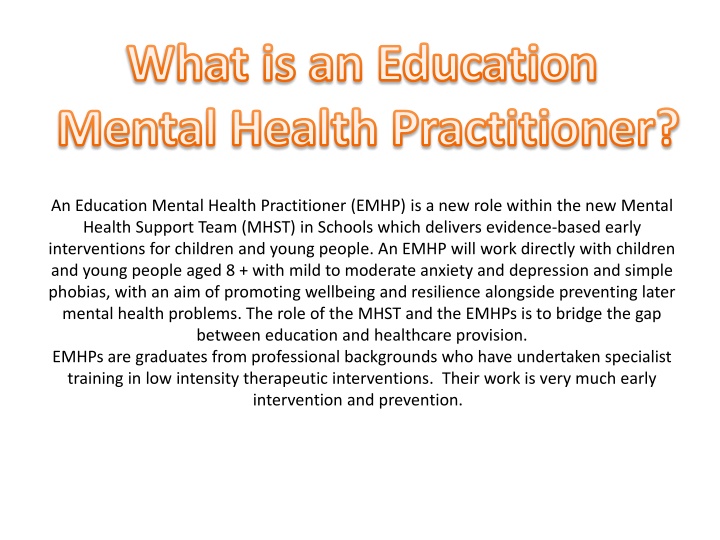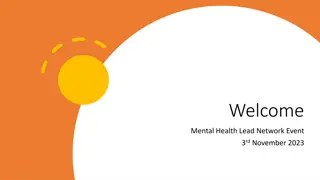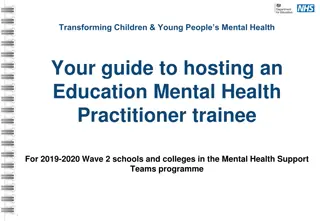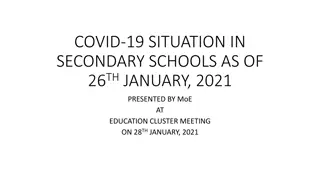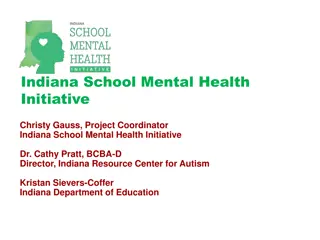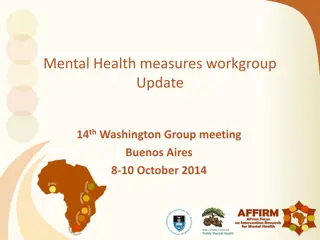Introduction to Education Mental Health Practitioners in Schools
Education Mental Health Practitioners (EMHPs) are specialized professionals within School Mental Health Support Teams who provide early interventions for children and young people with mild to moderate mental health concerns. They focus on promoting wellbeing, resilience, and preventing future mental health issues by bridging the gap between education and healthcare. School staff and parents can collaborate with EMHPs to address signs of anxiety, low mood, or challenging behaviors in children. The role involves early intervention, prevention, and collaborative work within the school environment.
Download Presentation

Please find below an Image/Link to download the presentation.
The content on the website is provided AS IS for your information and personal use only. It may not be sold, licensed, or shared on other websites without obtaining consent from the author.If you encounter any issues during the download, it is possible that the publisher has removed the file from their server.
You are allowed to download the files provided on this website for personal or commercial use, subject to the condition that they are used lawfully. All files are the property of their respective owners.
The content on the website is provided AS IS for your information and personal use only. It may not be sold, licensed, or shared on other websites without obtaining consent from the author.
E N D
Presentation Transcript
What is an Education Mental Health Practitioner? An Education Mental Health Practitioner (EMHP) is a new role within the new Mental Health Support Team (MHST) in Schools which delivers evidence-based early interventions for children and young people. An EMHP will work directly with children and young people aged 8 + with mild to moderate anxiety and depression and simple phobias, with an aim of promoting wellbeing and resilience alongside preventing later mental health problems. The role of the MHST and the EMHPs is to bridge the gap between education and healthcare provision. EMHPs are graduates from professional backgrounds who have undertaken specialist training in low intensity therapeutic interventions. Their work is very much early intervention and prevention.
How can school staff help? If you notice any children showing signs of mild to moderate anxiety, low mood or challenging behaviour that is stemming from mental health then contact Mrs Pound or Mrs Webb, the School's Designated Mental Health Leads. They will collect the relevant information and gain parental consent and take it to Consultation with a Senior Practitioner from the MHST Team (if no consent is gained then this can be done anonymously). Consultation takes place regularly throughout the school year. During consultation, the case will be discussed and if it is suitable for your EMHP then an assessment will be undertaken. If the case is suitable, direct short-term work will begin. If it is found not to be suitable, then the Consultation process will offer advice and guidance or signposting. Or we may identify an appropriate opportunity for Whole School Approach to undertake collaborative work between School, the EMHP and the wider MHST Team. Our aim is to fit in with your schools environment and work in collaboration with you, the children and their families.
What can parents and carers do? If you notice your child/children showing signs of mild to moderate anxiety, low mood or challenging behaviour, you can approach Mrs Pound or Mrs Webb (or your child s teacher) to voice your concerns. Mrs Webb or Mrs Pound can then discuss this further with you and will collect the relevant information and gain your consent to take it to Consultation with a Senior Practitioner from the MHST Team (if no consent is gained then this can be done anonymously).
As your Education Mental Health Practitioner is in her training year, she will be working within the green column during the training year Unfortunately, your EMHP can t work with children who primarily have safeguarding concerns and are not here to replace services such as Child and Family Wellbeing or Child Action North West etc.
Who is your Education Mental Health Practitioner? Your EMHP is called Simon and he works within your school on a Monday. He can be found in the Peace and Prayer space or in the Nest. What work will be carried out? 1:1 direct work with children aged 8+ with mild to moderate mental health over a course of 6-8 weeks Whole school approaches such as assemblies, group work, workshops, sharing information and finding resources Group Work or 1:1 work with parents and carers.
